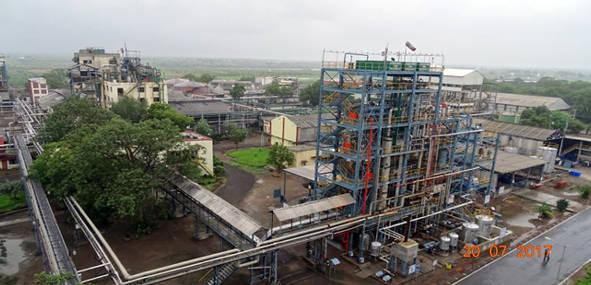-

Srivastava: focus on innovation
Both Samir and Sangeeta began to conduct research and development in bio-based chemicals. Their immediate task was to find ways to nurture all resources at hand and churn out ‘green’ chemicals and other bio-based products. Back then, another challenge came up when duty structures slipped. Nevertheless, Samir and his team took up the challenge and started testing new products and conducted extensive research.
“In those days, research and development was not exactly research but a quality-control department. Research and development was to innovate and think differently, and we set about systematically trying to see how we could innovate. We started the whole idea of renewable chemistry and creating research-oriented innovation,” says Samir.
This ideology set Godavari Biorefineries apart from other ethanol and chemical manufacturers even as it steadily expanded capacities and added products to its portfolio. Today, it has a turnover of over Rs1,500 crore, with 65 per cent of revenues coming from biochemicals and ethanol. Its diversified product range not only comprises biochemicals and ethanol but includes sugar, rectified spirits and other grades of alcohol, including a power unit for internal use.
Expanding operations
Godavari’s facility in Sakarwadi, Maharashtra, is dedicated to producing biochemicals. The facility, with an installed capacity of 101,197.40 tonnes per annum (TPA), produces ethyl acetate, bio-ethyl acetate, MPO, 1,3 butylene glycol, crotonaldehyde, acetaldehyde, acetic acid, bio-acetic acid and paraldehyde.
Bio-based manufactured chemicals are used in various industries, including agrochemicals, cosmetics, flavours and fragrances, food, fuel, paints and coatings, and pharmaceuticals. Over the years, the firm has expanded its scale of operations and global footprint, raking in marquee brands as customers.
Some of them include Biocon Ltd, Cipla Ltd, Deccan Fine Chemicals (India) Pvt Ltd, Dr Reddy’s Laboratories, Hershey India, and Hindustan Coca-Cola Beverages, among others. The firm has customers in over 20 countries including Australia, China, France, Germany, Italy, Japan, and the US. With offices in Hoofddorp (Netherlands) and Princeton, New Jersey (US), Godavari has access to international markets, wherein it can cater to overseas demand, and this with an eye on product development.
“We have built a base for now, and we have a wonderful set of companies that we cater too, and our days are very exciting because we are always innovating and working on the next set of products,” says Samir.
Godavari is also expanding its chemical production roster of products. It has received environmental clearance to expand its existing capacities to manufacture a wider range of specialty chemicals, including cellulose, MCC, xylitol, EVE, furfural, lignosulphonate and bio-composites. The market for green chemicals is growing, and the firm also has the ability to price its products at a premium, thanks to the green charge.
Sangeeta Srivastava, now executive director, points out that innovation and optimisation of resources have been the key pillars of the company’s progress. “From the start we have focused on innovation and research. Our access to raw materials is central to our success and we will continue to commercialise new products, and achieve optimum utilisation of our resources.”
Ethanol growth
Godavari Biorefineries has been successful in utilising sugarcane as feedstock for a vast range of its products, including sugar and ethanol. It is one of the few companies in India to use sugarcane juice and syrup to produce ethanol, says the Frost and Sullivan report. Its long history of purchasing sugarcane and the support provided to farmers have built strong relations and goodwill among sugarcane growers.
-

Khetan: achieving better margins
Its unit in Sameerwadi is an integrated plant dedicated to manufacturing rectified spirits and ethanol, and sugar. The firm can crush about 15,000 tonnes per day (TCD) of sugarcane. Besides, it has installed capacity of 400 KLPD for rectified spirits. Also, the 380 KLPD for ethanol and power with an aggregated installed capacity of 49.56 MW as on 30 June, 2021 makes this facility one of the top 10 sugar complexes in India, and one of the largest producers of ethanol.
Over the years, the company has striven to improve the valorisation of sugarcane through developing downstream products and increasingly diverting sugarcane toward value-added products. It sells sugar and certain other food products under the ‘Jivana’ brand. Its rectified manufactured spirits are used internally and converted into various grades of ethanol, including fuel ethanol, pharma-grade ethanol and extra-neutral alcohol.
No doubt, for sourcing sugar, Godavari has a long-standing relationship that goes a long way to ensure that supplies are high. “We believe that through our long history of purchasing sugarcane and continued support provided to farmers, we have established strong relationships and goodwill among farmers,” says Balachandra Bakshi, executive director, who looks after farmer relations and holds several years of experience in the agricultural industry.
Among its several expansions within sugar, Godavari Biorefineries is also planning to manufacture cellulose and its derivatives by utilising bagasse. It also intends to leverage its expertise and capabilities to manufacture other products across the value chain.
Further, with the government’s emphasis on increasing ethanol blending for fuel, the company is on an expansion spree. It aims to improve the valorisation of sugarcane and increase its capacity to manufacture ethanol from 380 KLPD (as at 30 June, 2021) to 570 KLPD in the coming quarters. It has received the requisite environmental clearances.
Not content with this, it is evaluating prospects of manufacturing second-generation ethanol and energy to further increase feedstock for its distillery. All these expansions will provide it with more resources and strengthen its competitive edge in chemicals and sugar-based ethanol.
It started ethanol manufacturing in the early 60s. “We had a strong advantage in India, and we expanded ethanol capacity considering that sugarcane surplus is an asset in the country. It did not happen for a while, but it’s a good thing that ethanol blending became a reality and we rapidly expanded our ethanol facilities,” says Samir.
Godavari extensively uses sugarcane feedstock at its Sameerwadi plant to manufacture sugar, rectified spirits and ethanol. Besides, the pressmud is utilised to produce fertilisers under the ‘Bhumilabh’ brand.
Industry drivers
Godavari’s business growth seems assured. With the Indian government set to cut pollution and reduce its oil import bill, and plans to gradually increase ethanol blending in petroleum products, such a change is being billed as the largest in the global sugar market since Europe’s sugar reforms.
India’s ethanol program will help end the government’s sugar export subsidies and erase exportable sugar volumes from the country. At present, the sugar sector produces almost six million tonnes of surplus sugar every year, which can be diverted to produce 700 crore litres of ethanol (of the total 1,000 crore litres required); the balance can be produced from excess grains.
The government’s allowing ethanol through grain-based distilleries as well offers an additional stream of revenue to some sugar companies which are willing to expand. At present, the excess sugar produced is exported. This surplus can be reduced by two million tonnes.
-
From the start we have focused on innovation and research. Our access to raw materials is central to our success and we will continue to commercialise new products, and achieve optimum utilisation of our resources
By 2023, India is planning to have zero surplus sugar through the diversion to ethanol (with two MT every year till 2023). With a considerable increase in ethanol sales and the demand-supply balance evening out, integrated sugar mills are expected to increase cash flows.
With ethanol blending by oil-marketing companies (OMCs) picking up pace and with the Government’s stance on increasing the blending target to 20 per cent, supported by remunerative ethanol pricing and incentive schemes to build capacities, the prospects of the sugar sector are looking brighter. All this is projected to expand the Indian ethanol market from $3.6 billion in 2020 to $8.9 billion by 2025, a 19.8 per cent CAGR, says the Frost and Sullivan report.
In its other vertical, growth in domestic biochemicals is expected to further pick up momentum. India has bio-mass potential, which could easily be relied upon to fulfil much of its energy needs. An estimated 50 million metric tonnes (MMT) of liquid fuels are consumed annually in India, but with the actual bio-mass potential and its full utilisation, India is capable of generating much of that every year.
Besides the growing awareness of the ill-effects of certain chemicals on humans and the environment, a growing trend is being seen in the shift to green chemicals and sustainable chemistries. These are bio-degradable products which significantly reduce the environmental impact when applied.
Biochemicals is an emerging focus among manufacturing industries. They minimise pollution at the molecular level. Growing policy measures to encourage green chemistry are also leading to market growth. If the demand for biochemicals is not met, global companies will also look at the China Plus One strategy to meet the sourcing needs for chemicals. That places Indian chemical companies like Godavari on a strong footing.
Verdant days ahead
Godavari Biorefineries’ expansion plans in ethanol blending should help it capitalise on these growth opportunities in the industry. The company is planning to tap the capital markets to raise funds to help it expand its sugarcane crushing capacities, as well as retire debt. It has earmarked about R45 crore toward the expansion of its crushing facility at Sameerwadi. Besides, it will repay debt of Rs214 crore. All in all, Godavari Biorefineries plans to raise about R370 crore for expansion and debt reduction through a fresh issue.
As a part of its growth plan, it will continue to diversify its product range, and increase production of higher-margin products in the value chain. In the past two years, revenues have been stagnant due to the impact of Covid-19. However, due to greater operating efficiencies and higher-margin products, its net profit jumped more than threefold from Rs5.5 crore in FY19 to Rs27.1 crore in FY21. The operating margin improved from 9.33 to 10.72 per cent.
-

Godavari's Sameerwadi unit is an integrated plant dedicated to manufacturing rectified spirits and ethanol, and sugar
“The flexibility in our plants for blending helps us adapt to changing market dynamics and optimise our product mix to optimise realisations and achieve better margins,” says Naresh Khetan, chief financial officer, GBL.
When it comes to research, Godavari Biorefineries has three research and development facilities at its manufacturing plants, and one in Navi Mumbai. It expended Rs15 crore toward research in FY21. As of 30 June, 2021, it had 38 research scientists at its R&D centres to identify and develop potential marketable products after carrying out thorough studies, including product specifications, potential costs and timelines.
Not only that: it is collaborating with Dr Sendurai Mani in developing small molecule inhibitors for cancer, and obtained approval in March 2021 to undertake, over two years, clinical trials in relation to a proposed drug.
“It is thought that India can never create a new molecule in medical research. Over the last 10-12 years, we actually found a molecule, and have received permission for clinical trials very soon for triple-negative breast cancer,” concludes Samir, whose passion and commitment for innovation and research have been one of the hallmarks of growth for GBL. If the research, expansion and strategies for growth pay off, it seems that for GBL, the sky is the limit.





































